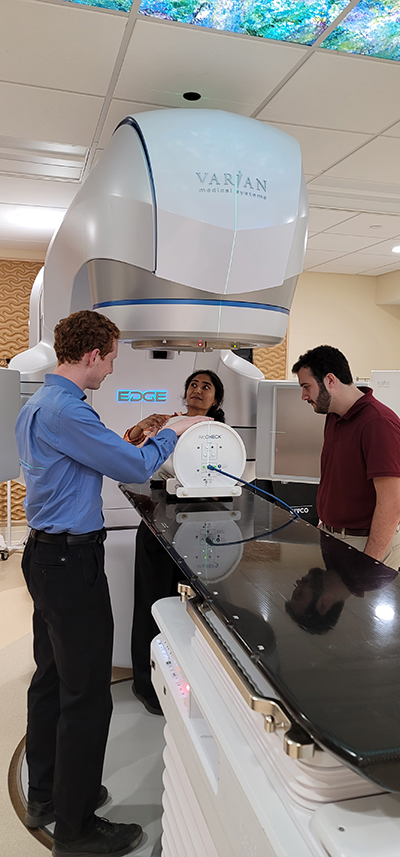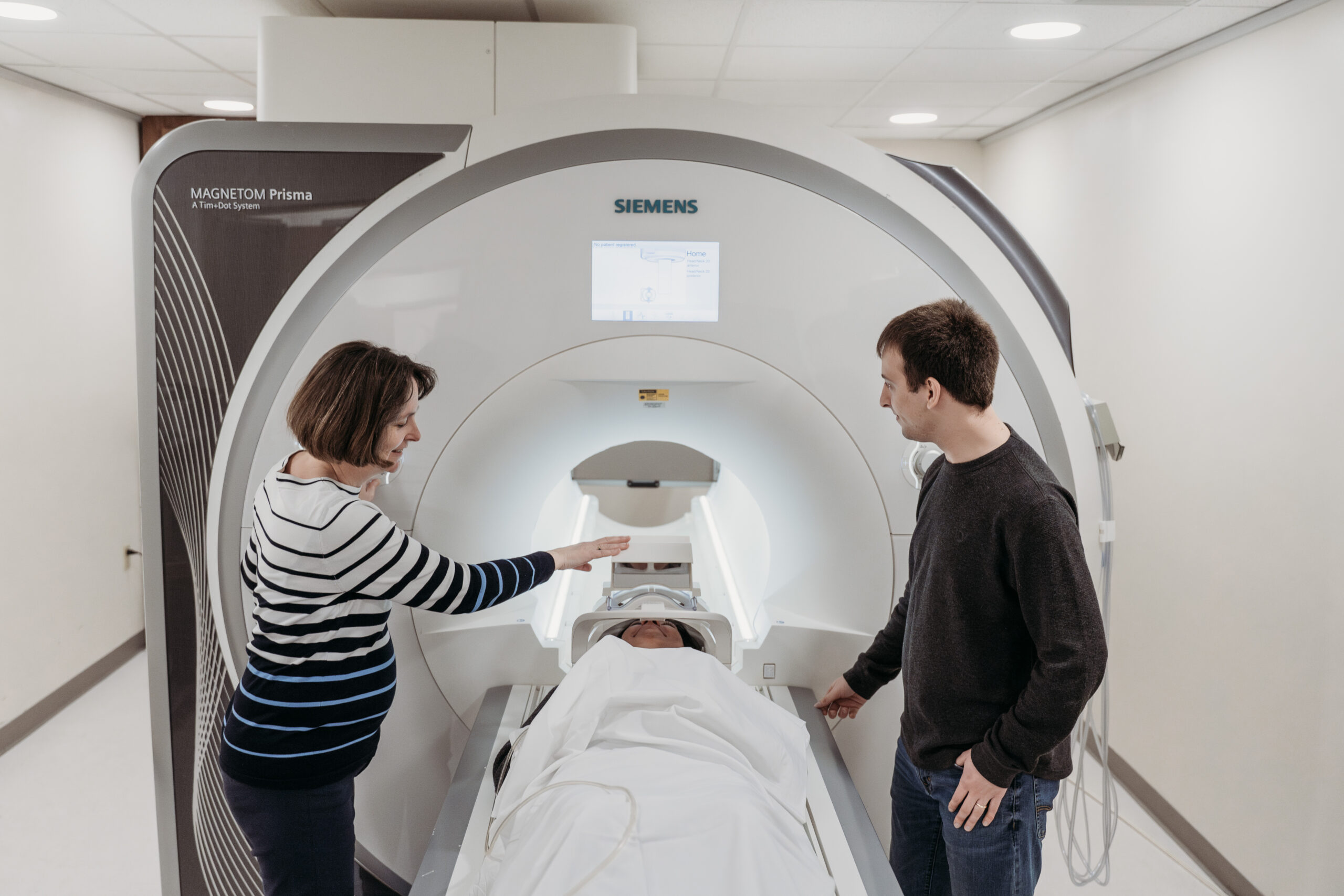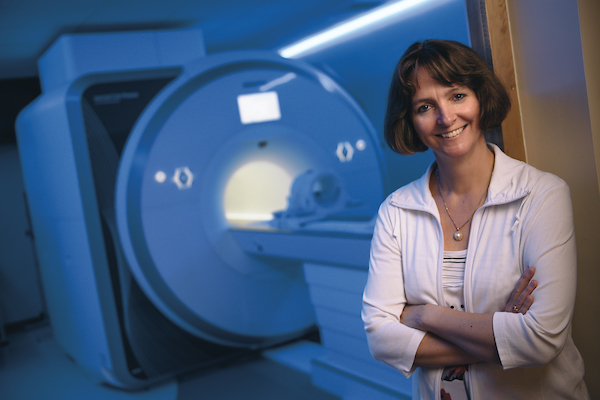Medical physics is an applied branch of physics that applies physical energy to the diagnosis and treatment of disease. Professional medical physicists are involved in clinical service, consultation, research and teaching.
At Purdue, the medical physics graduate program provides a strong foundation in radiological and applied physics training within the medical physics profession — but also offers advanced coursework, clinical laboratories, internships and opportunities to participate in cutting-edge research. The medical physics program is closely aligned with biophysics, biomedical engineering, medicine and health physics (radiation protection and control).
Our goal is to provide courses and experience with clinical systems to enhance problem-solving skills and individual thought to further advance the field of medical physics.
The Purdue medical physics program is CAMPEP-accredited.
Program Highlights
Meet and learn from your peers by joining the Medical Physics Club of Purdue or the Purdue Association for Magnetic Resonance.
Program Statistics
- 2023 to 2027 (PDF)
- 2018 to 2022 (PDF)
- 2012 to 2017 (PDF)
A program must publicly describe the program and the achievements of its graduates and students, preferably through a publicly accessible web site. This information must be updated no less often than annually and must include, for each degree program (MS and/or PhD), the number of: applicants to the program, students offered admission, students matriculated, and graduates. Where possible, information on the destinations of graduates must also be provided, i.e., residencies, industry positions, etc.
Semester Meeting

Program Highlights
- You will be integrated into faculty laboratories and clinical facilities to work with faculty on a variety of research projects to advance disease diagnosis and treatment.
- Clinical laboratories and internships are available in therapeutic and diagnostic physics at the Purdue Life Science MRI facility, in radiology at Purdue’s College of Veterinary Medicine and at Memorial Medical Hospital and in radiation oncology at the Indiana University School of Medicine Hospital.
- Advanced coursework is offered in oncology, MRI theory and acquisition, magnetic resonance spectroscopy, PET/SPECT imaging and more.
Potential Careers
- Scientist in industries associated with radiological and radiation therapy equipment and support
- Scientist within state and federal government agencies
- Therapeutic medical physicist
- Diagnostic medical physicist
- Medical health physicist
Concentrations
Requirements MS Plan of Study MS Thesis Plan of Study PhD Plan of Study Certificate Plan of StudyProgram Quick Facts
Degree Type:
Certificate,
Master’s, Doctoral
Program Length:
Certificate: 9 months (only students with prior PhD are eligible)
Master’s: 2
PhD: 4-5 years entering with BS, 2-3 years entering with MS
Location:
West Lafayette, IN
Department/School:
School of Health Sciences
Research
You will have the opportunity to work directly with medical physics faculty on interdisciplinary projects to advance understanding of image-guided and biology-based therapy; diagnostic imaging of cancer, neurological function and disease; and new uses of particle beams in detection and treatment.
Faculty
- Qiuhong He
- Ulrike Dydak
- Linda Nie
- Oluwaseyi (Seyi) Oderinde
- Matthew Scarpelli
- Aaron Specht
- Keith Stantz

Research Opportunities
- MRI and MRS in diagnosis of neurotoxicity and radiation response
- Neutron and X-ray technologies for human body composition, disease diagnoses, and radiotherapy
- Imaging and tracer development in PET and SPECT
- Dynamic contrast enhanced imaging (CT, PCT) and thermoacoustic in image-guided therapy
- IMRT and normal tissue response to radiation therapy
Research Areas
Research Facilities
- Life Science MRI facility
- The Birck Nanotechnology Center
- The Bindley Bioscience Center
- The Regenstrief Center for Healthcare Engineering
- Purdue’s Center for the Environment
Admissions/Requirements
Applications submitted prior to January 10, 2023 will be considered for fellowships and awards.
Applicants to the MP program are expected to have an undergraduate degree in physics, engineering or comparable academic training, such as Purdue’s B.S. degree in Pre-Medical Physics. Minimum undergraduate coursework typically include:
- Analytic Geometry and Calculus (2 semester sequence), Multivariate Calculus and Differential Equations (1 semester)
- General Chemistry (2 semester sequence)
- Fundamentals of Biology (2 semester sequence)
- Human Anatomy and Physiology (2 semester sequence)
- Modern Mechanics, Electricity and Optics, Electricity and Optics Laboratory, Modern Physics, Modern Physics Lab, Intermediate Mechanics, and Quantum Mechanics
- Elementary Statistical Methods
Students that have not completed prior coursework in anatomy and physiology upon entry into the program are required to take a 2-semester sequence of anatomy and physiology (BIOL 301/302 or BIOL 203/204). Alternate plans of study are available for students that do not have the equivalent of a B.S. or minor in physics. Students with other deficiencies in their undergraduate curriculum may be accepted or conditionally accepted into the program at the discretion of Head of the School. Students accepted on a conditional basis may be required to take additional 100, 200, 300 or 400 level classes to address coursework deficiencies. A grade of B or better in all 100, 200, 300 or 400 level classes and a cumulative GPA of 3.0 or better at Purdue University is required for students accepted on a conditional basis. Upon completing the identified deficiencies, the Head of the School, in consultation with the RHS Program Director and GC Chair, re-evaluate the admission status of conditionally accepted students and either accept or deny admission into the MP graduate program. Conditionally accepted students that are ultimately denied admission into the MP program are counseled on possibly alternate degree paths at Purdue as well as alternative career paths.
View Admissions Criteria
Ulrike Dydak | Program Director
For questions regarding the medical physics graduate program, please contact our graduate coordinator, Karen Walker, at kwalker@purdue.edu.